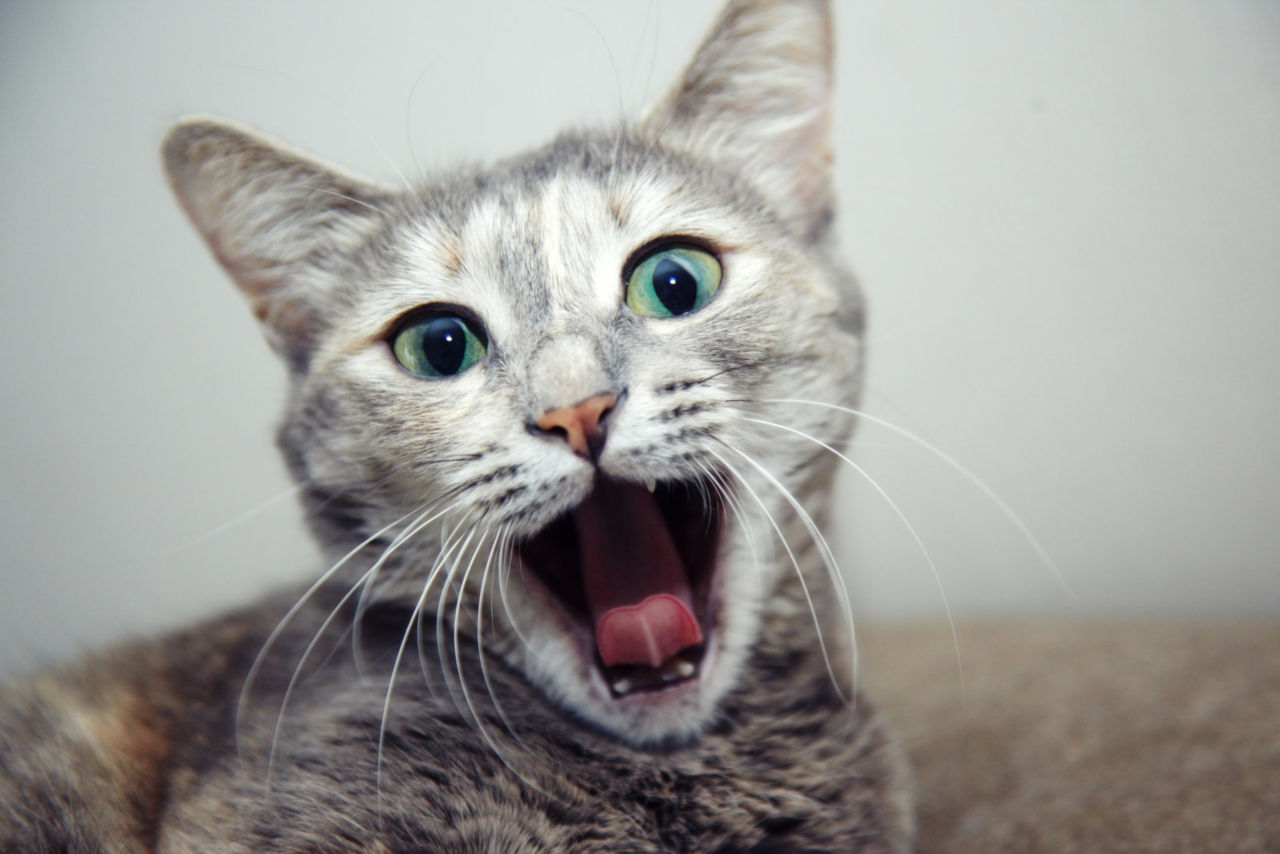Burping is actually quite rare in cats. So, if they burp frequently, it’s probably a sign that something is wrong. Unfortunately, there is little information about why cats burp.
Cats rarely burp as they breathe through their nose. Most often, cats expel excess gases through their rectum. Burping is usually caused by the cat swallowing too much air while eating, drinking, or playing. The gases released from the stomach travel upward and cause burping. However, burping can also be caused by an upset stomach, hairballs, a poor diet, heartburn, or esophagitis. When your cat has respiratory or nasal problems, its sounds resemble burping, and you could easily mistake them.
Pay attention to the sounds your cat makes, as they can help you determine if something is wrong with your cat. If your cat burps frequently, there is likely a health problem.
Why Do Cats Burp?
Because burping is so rare, it’s easy to confuse it with the sounds and symptoms of various diseases.
Burping is not a typical sound in cats. Most veterinary journals don’t even mention that it can occur or how to treat its associated problems.
Some veterinarians even say that burping is not possible for cats. However, there are reasons why cats may burp.
Swallowing Air
Cats swallow air all the time. They do this while eating, playing, sleeping, purring or drinking water.
When they do this, the stomach releases gases that sometimes travel upward instead of downward and come out of the esophagus as burps.
Some cats also gag when they swallow. This condition is known as dysphagia, the medical term for dysphagia.
It may present as oral, pharyngeal, or cricopharyngeal dysphagia. It can have many causes, some treatable and others not.
Symptoms include:
- Dental disease
- Inability to open the mouth
- Paralysis of the tongue or jaw
- Swelling or breakdown of the muscles responsible for chewing
The excess air that cats swallow when they eat must come out somewhere. And if it can’t escape through the rectum, it escapes through the esophagus.
Stomach Upset
Cats often get stomach upset, especially when hunting and eating their prey.
Even something as simple as eating too fast can cause stomach upset.
Combined with excess gas, this can cause your cat to burp. This will provide relief for the cat.
Some of the most common causes of an upset stomach include:
- Parasites
- Foreign bodies
- Stomach ulcers
- Toxic substances
- Food intolerances and allergies
- Bacterial infections
Here’s how to prevent your cat from getting an upset stomach from its food:
- Keep an eye on what your cat eats.
- When you change your cat’s food, do it slowly.
- Feed your cat an essential meal of cooked chicken and rice that is easy to digest.
- Do not feed table scraps or leftovers.
Once your cat’s stomach problems subside, he shouldn’t burp as often.
Vomiting
When cats vomit, their sounds are pretty similar to burping.
Eating too quickly is among the most common causes of vomiting, leading to excess gas buildup.
Cats also frequently expel hairballs. Like vomiting, the sounds cats make when they cough up hairballs sound like a series of burps.
Many cat owners can tell the difference between burping and vomiting, but the reasons are closely related.
Inappropriate Food
Cats are obligate carnivores; they need protein to survive.
Cats should be fed an appropriate diet that contains all the amino acids, minerals, and vitamins they need to stay strong and healthy.
Protein only benefits cats if they can absorb and digest it properly.
Owners who share their food with their cats or give them too many carbohydrates or fatty foods make it difficult for their bodies to digest.
This can cause them to experience bloating. This can then lead to burping as well. If possible, choose cat food that contains the following ingredients:
- Cooked protein – 98%
- Muscle meat (chicken, rabbit, turkey) – 92 %
- Offal (kidney, lung, liver, heart) – 90%
Animal proteins are more digestible than vegetable proteins. Be sure to balance macronutrients in your cat’s diet to preserve good gut health and prevent regurgitation.
Check for food intolerances and allergies if you notice your cat regurgitating after eating. These can also disrupt your cat’s gastrointestinal tract.
Esophagitis
If your cat burps in addition to repeatedly swallowing, gagging, and licking his lips, the cause is usually esophagitis. In this case, the esophagus is inflamed.
There are three leading causes of this condition:
- Gastroesophageal reflux, which is also known as heartburn.
- Anesthesia causes the muscle that closes the esophagus to relax too much, causing stomach acid to build up.
- Medications that can get stuck in your cat’s throat and irritate the esophagus.
Cats suffering from esophagitis experience gastrointestinal irritation, causing them to regurgitate more.
If left untreated, this can lead to aspiration pneumonia, a severe condition when food enters the lungs. Symptoms of esophagitis include:
- Belching
- Gagging
- Drooling
- Difficulty swallowing
- Repeated swallowing movements
- Decreased appetite
- Weight loss
- Pain or vocalizations when swallowing
If your cat burps with any of these signs, have him or her examined by your veterinarian. Your cat may need surgery to correct the problem.
Reflux
Reflux, or gastroesophageal reflux, can cause frequent burping.
In a healthy upper digestive system, the sphincter muscle in the stomach closes to prevent digestive juices from flowing upward.
When the acids in the stomach become too strong, the fluids pass through the sphincter.
Over some time, the esophagus becomes inflamed and painful, causing the esophagitis described earlier.
Reflux is common in cats, especially young cats whose esophageal sphincter is not yet properly developed. Stress and improper diet can also be the cause.
Cats with reflux show the following symptoms:
- Pain
- Howling
- Excessive meowing
- Loss of appetite
- Weight loss
- Vomiting or spitting out food
- Frequent belching
A veterinarian may administer medication to treat reflux and relieve your cat’s burping. You should also improve your cat’s diet and reduce his food intake.
Why Do Cats Burp After Drinking Water?
If your cat burps after drinking water, he probably swallowed too much air. Water can be just as problematic for cats as food.
Burping could also indicate an underlying health problem.
It is also possible that your cat is not burping but hiccuping. The reasons for hiccups in cats are similar to the ones for burping.
The most likely cause is drinking water too quickly. Hiccups occur when the diaphragm involuntarily contracts at the same time the glottis closes.
The reason for this is an irritation of the nerve that runs to the diaphragm.
A normal hiccup usually lasts no more than a day and goes away on its own. If it doesn’t disappear, take your cat to a veterinarian.
Why Do Cats Burp and Fart at the Same Time?
Excessive flatulence causes your cat to burp and fart. Your cat shows these reactions because his body is trying to expel as much air as possible.
Cats can be uncomfortable swallowing too much air, so they burp and fart to feel more comfortable.
There may also be other things going on in the body. These include parasites and intestinal diseases.
If you suspect your cat is uncomfortable and suffering from too much gas, your veterinarian should examine him. He can make sure everything is okay.
If the vet gives the all-clear, something in your cat’s diet is likely causing too much bloat.
What Cat Health Problems Sound Like Burping?
Since cats rarely burp, the sounds your pet makes are more likely to have entirely different causes.
When we hear unfamiliar sounds, we associate them with sounds we know.
Pay attention to the sound the next time your cat burps to determine if it could be something else.
There are some possible other causes for the sound.
Respiratory Sounds
Cats with breathing or lung problems often make rattling, wheezing sounds when they are struggling to breathe in enough air.
These sounds have a surprising resemblance to burps. Breathing problems often occur due to:
- Foreign objects lodged in the throat.
- Physical trauma, either internal or external.
- Parasites in the heart and lungs.
- Injuries to the respiratory system. This includes a wound in the throat.
If you are unsure if your cat is burping or having respiratory problems, carefully open the mouth and examine the throat and mouth for signs of blockage.
Please do not attempt to remove the blockage yourself, or you may push it further down the throat.
Heart failure, although much less common, can also make breathing difficult. Fluid accumulates, affecting the lungs. This is much more common in old cats.
Cats can also inherit a megaesophagus, a malformation of the esophagus that develops in the womb. It is usually not diagnosed until the kitten transitions from milk to solid food.
Treatment for megaesophagus depends on the individual cat. However, if your cat burps frequently and repeatedly and can’t stop, all these problems are possible causes.
Nose Issues
Cats with nasal issues make various sounds, many of which can sound like burps to the untrained ear.
To breathe, they open their mouths so it looks like they are burping. This is not normal for cats and can alarm cat owners.
Similarly, cats with too-small or blocked nostrils snore when they sleep. These random snoring sounds are similar to burping, mainly if they occur infrequently.
Nasal problems are more common in brachycephalic or flat-faced cat breeds.
One of these is brachycephalic obstructive airway syndrome (BOAS). The smaller the cat’s nose is in relation to its face, the more likely it is to have this condition.
Symptoms include:
- Cough
- Dyspnea, which is heavy, difficult breathing
- Gasping for breath after small efforts
- Snoring
- Cyanosis, which means low oxygen levels
- Swelling of the airways
- Fainting
Flat-faced cats also produce more noise because their nasal passages are much narrower.
Both the nostrils and the inner nasal chambers are thinner, which slows airflow and causes cats to feel congested.
Some cats have an elongated soft palate, making it difficult to breathe and swallow.
Although these problems may not be immediately associated with burping, the sounds associated with breathing and nasal issues can easily be mistaken for burping.
However, cats usually have other symptoms that indicate a health problem.
Coughing
Have you noticed that your cat is coughing? Coughing is not too common in cats, but it can cause a sudden, loud expulsion of air from the lungs.
Some coughing fits end with gagging, which can sound like burping.
If you hear your cat burping and coughing simultaneously, your pet has probably suffered an irritation or inflammation of the larynx or trachea.
Since cats are very susceptible to colds, this should hopefully subside after a few days. If not, you should see a veterinarian.
Asthma
Asthma, a lower respiratory disease, affects about 5% of cats.
Experts don’t know exactly what causes it, but they suspect it results from an allergic reaction to something the cat inhales.
Some cats have a more severe form of asthma than others. Symptoms include:
- Difficulty breathing
- Coughing
- Gagging
- Rapid breathing
- Wheezing
- Vomiting
- Chronic cough
- Weakness
- Lethargy
Your cat may also huddle and cough or breathe quickly. Some of these sounds, namely chronic coughing and wheezing, can sound like burping.
Conclusion: Can Cats Burp?
Burping is a typical phenomenon in cats that can have many causes.
Most likely, simply excess gas is the cause. However, persistent burping should always be checked if other symptoms accompany it.


